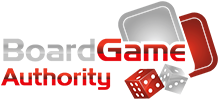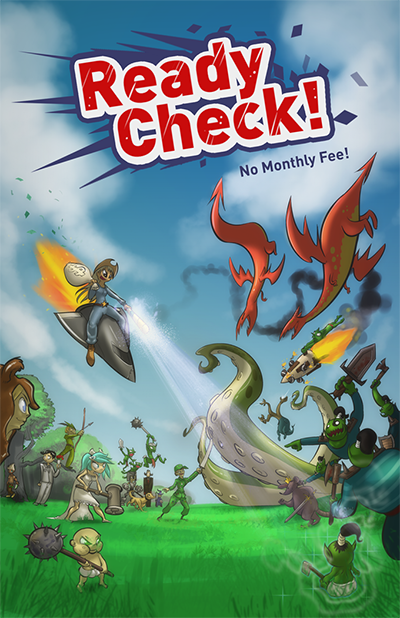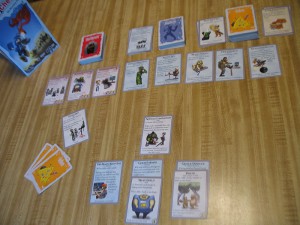 Raiding a dungeon is typically held up as the pinnacle activity for players of massively multiplayer online videogames. You and four, or nine, or nineteen (or gods be with you thirty-nine) of your closest friends delving deep into monstrous lairs to extract adventure and treasure. What could be better? There’s a reason that dungeoneering has been well-represented across all forms of tabletop gaming.
Raiding a dungeon is typically held up as the pinnacle activity for players of massively multiplayer online videogames. You and four, or nine, or nineteen (or gods be with you thirty-nine) of your closest friends delving deep into monstrous lairs to extract adventure and treasure. What could be better? There’s a reason that dungeoneering has been well-represented across all forms of tabletop gaming.
But that’s not what this game is about. In this game you play the hapless dope who has to organize a crowd of random people found online into an effective fighting force, along the way managing personalities, distributing loot, assigning roles, and fending off rival guilds. Speaking as a person who put in his time leading a raid against a certain wrathful king with lich-like qualities, I thought Ready Check had a lot of true things to say about the experience.
Gameplay:
Ready Check comes with three decks of cards: Forum, Dungeon, and Loot. The Forum deck is just a collection of the real life people you might meet and recruit, running the full gamut of positive (Officer Material) and negative (4000 Ping, Internet Bully, Always AFK) stereotypes. There’ll always be five of these flipped up in the center of the table, making a pool from which all players recruit.
The Dungeon deck is an assortment of dangerous places for your teams to go raid, and at the start of each player’s turn, another one will flip up in the center of the table (unless there are already three in play). These dungeons have varying levels of game text, and a few other common attributes. Toughness is the target number your party is trying to overcome with their Power. Loot indicates how much treasure you get for beating the dungeon. Victory Points are your ultimate goal, as defeated dungeons go into your score pile. The first player to 20 points wins. Finally, dungeons may have a wipe condition, which is another way to fail on your attempt. As an example, The Hellscape of Baron Grimgarr Von Mean (hilarious name) will fail you if, at any point during your run, you have fewer than two damage-dealers (DPS). On the other hand, Generic Fire Dungeon (even funnier) requires you to always have one Leader along.
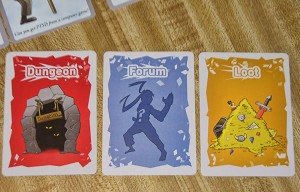 The third deck is the Loot deck, and it’s full of shiny things. And also some terrible things at random, because I guess they had to go somewhere. In here you’ll find things like character classes to assign to your players (generating most of your Power), treasure to go into your guild stash (which can potentially buff all your players), and positive effects to play during your turn. Balancing this, you’ll also find negative effects to play against your opponents, and Patch Notes cards, which are mandatory immediate plays that create a new global rule for all players (and also deprive you of that card). At the start of the game, everyone gets five Loot.
The third deck is the Loot deck, and it’s full of shiny things. And also some terrible things at random, because I guess they had to go somewhere. In here you’ll find things like character classes to assign to your players (generating most of your Power), treasure to go into your guild stash (which can potentially buff all your players), and positive effects to play during your turn. Balancing this, you’ll also find negative effects to play against your opponents, and Patch Notes cards, which are mandatory immediate plays that create a new global rule for all players (and also deprive you of that card). At the start of the game, everyone gets five Loot.
On your turn, you have four basic actions that you can perform, up to once each: recruit a new player, kick a player out of your guild, play a character class from your hand onto one of your players, or play a stash treasure card in front of you. Then, you can either go grind if your guild is weak (draw two treasure cards, keep one), or attempt to run a dungeon. If your guild is big enough, you can split them up and attempt multiple dungeons. During the run you and your opponents can play effect cards to mess with the outcome (character class cards also have the option to be discarded for a special power during a dungeon run). That’s the game; you’re ready to play.
And here’s where things go sour. Towards the mid-game of Ready Check, you will find yourself running a dungeon with three of your guild members, each of whom has a character class. You will also have a treasure or two in your stash, and there will be some patch notes in play. That’s at least nine different cards, all of which have game text ranging from simple (+1 power if playing a healer) to the complex (Actual quote here: “During a Raid you may play a Class card from the loot discard pile and place it in your Stash as if it were on a Guildmember. Discard this Class at the end of the Raid.”). And every time someone punches one of your raiders out, you need to recompute your power, and check the wipe condition again. And you’ll be doing this for your opponents, too, because you have to know if it is worth playing your Effect cards to stop them.
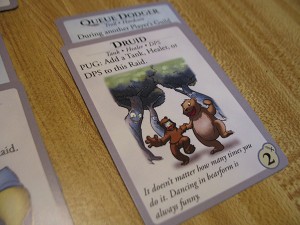 There is the potential to drown in a sea of text here.
There is the potential to drown in a sea of text here.
But, if you’re having fun making video game jokes with your friends, this may be no big deal. So, if we put that main objection aside, we’re left with only a few minor flaws. The game is going to be very swingy and random. Some cards are better than others. The Patch Notes rules may be a boon, or they may kick you in your pants while stealing a card from your hand. If you’re playing with someone who has never played Everquest, World of Warcraft, or the like, then the jokes are going to fall flat for them. And I hope you like screwing with your buddies’ turns, and getting the same in return.
Balancing that, we have a game that is legitimately funny (which is rare enough in tabletop gaming), offers some fun in creating good synergies for your team, and progresses much more deliberately towards an end condition than does Munchkin.
Replay Value:
Mathematically speaking, no two games of Ready Check will ever be the same. If you end up loving this game, rest assured that you can come back to it again and again.
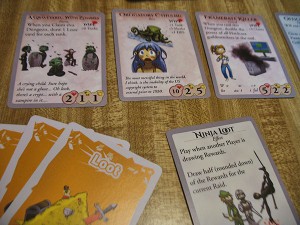 Rulebook:
Rulebook:
A breezy four pages, the rulebook managed to cover the rules well enough that we only needed to reference it once, all while finding time to squeeze in some jokes (good jokes!), and give explanations for some video game terms in case the reader wasn’t familiar with them.
Final Verdict:
If you have a gaming group that loves MMOs, and doesn’t mind a silly, chaotic, sometimes-slow game, then Ready Check is for you. Check out the Kickstarter for Ready Check.
((Note: A prototype copy of Ready Check was provided for this review.
